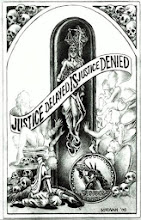
Durbin offered proof of column
By Charles Hurt
THE WASHINGTON TIMES
Published August 15, 2005
A law professor who used Senate Minority Whip Richard J. Durbin as a source for a column last month about federal Judge John G. Roberts Jr. -- a column that Mr. Durbin later disputed -- has a taped phone message that he says proves the accuracy of his reporting.
"The taped message is consistent with my notes as well as my email and telephone communications with editors," George Washington University law professor Jonathan Turley wrote in a letter earlier this month to Mr. Durbin. "There was never a question as to the accuracy of the [column]. The only issue ever raised by your staff was whether you would be mentioned in the article."
In a column last month in the Los Angeles Times, Mr. Turley wrote that during a private meeting with Mr. Durbin, Judge Roberts "was asked by Sen. Richard Durbin [Illinois Democrat] what he would do if the law required a ruling that his church considers immoral," Mr. Turley wrote.
"Roberts appeared nonplused and, according to sources in the meeting, answered after a long pause that he would probably have to recuse himself," wrote Mr. Turley, who added that it was "the wrong answer."
Conservatives immediately accused Mr. Durbin of applying a religious "litmus test" to the Roberts confirmation, and Mr. Durbin said the column was inaccurate.
"I don't know who was his source," Joe Shoemaker, Mr. Durbin's spokesman, said the day the column ran. "Whoever the source was either got it wrong or Jonathan Turley got it wrong."
After Mr. Turley named Mr. Durbin as his source and Mr. Shoemaker as the second, confirming source, Mr. Durbin's office acknowledged Mr. Durbin's involvement. But still, the Durbin office maintained that Mr. Turley had gotten his facts wrong even though he was taking notes as the senator spoke.
In an Aug. 4 letter to Mr. Durbin, Mr. Turley laid out his detailed recollection of the situation and quoted extensively from a taped telephone message from Mr. Shoemaker.
"While speculation continues as to what was said in your meeting, I wanted to establish that everything said in my article was taken directly from my notes, confirmed by your staff, and never questioned on any point on accuracy," Mr. Turley wrote. "I stayed out of this controversy for over two weeks as your staff has insisted that the account was inaccurate. However, it is grossly unfair to present this matter as an error on our part when we specifically confirmed the account with your staff and never heard a single objection on accuracy until the story ran."
Mr. Durbin's office refused to comment on the letter.
"I'm not going to dignify this with a response," Mr. Shoemaker said. "Turley got his facts wrong."
But Mr. Turley said that on the day before the column ran, he read the relevant portions of his column to Mr. Shoemaker.
"Mr. Shoemaker confirmed that he was present at the time and that 'it happened exactly the way the Senator said,' " Mr. Turley wrote in his letter to Mr. Durbin. "He agreed that the recusal statement was 'incredible.' "
The only quibble at that time, Mr. Turley said, was whether to quote Mr. Durbin by name even though the senator never requested anonymity.
"However, he asked for me to use 'a senator' rather than your name in the article," Mr. Turley wrote in reference to Mr. Shoemaker. "He explained that, given the explosive nature of the answer, he did not want the account to seem like it came directly from you."
After a day of trying to track down Mr. Durbin, Mr. Shoemaker left Mr. Turley a telephone message.
"In the message, Mr. Shoemaker made no objection to the accuracy of the recusal story," Mr. Turley wrote. "Rather, after insisting that our discussion was 'a casual conversation,' he again objected to the use of your name.
He objected that everyone would know that you were the source. He then repeated the position of your office that '[t]he only condition under which you can use that is to not identify our office, not identify Durbin, and to say that this came up in the course of several meetings with several senators.' "


0 Comments:
Post a Comment
<< Home